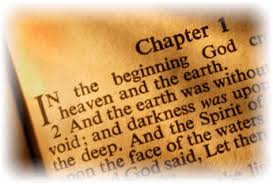The Creative Character of God
Bereshith bara Elohim et Hashamayim v’et Ha’arets.
(In the beginning – created – God – alef tav – the heavens – and (alef tav)- the earth)
Yesterday as I was praying about the revealed character of God, I realized that two of his most important attributes are mentioned before He is — primarily, that He was here in the beginning (bereshith), and secondly, His status as Creator. I thought about how fascinating that was, that the Hebrew word “bara” was mentioned even before God Himself, and how significant that had to be.
If I was writing my biography, I would have started it with the word “I” and then the word “was” or “am,” but God started out His biography with an expression of His eternal nature and creativity. And as I meditate on it, I see it as the ultimate expression of His revealed majesty. Unlike us, He was, is and is coming. Unlike us, He can create anything out of nothing.
Everything that is good, He created it from nothing. Every particle of energy, every drop of water, every spec of sand on the seashore, every plant, every star, every fish, every animal, and man – created from nothing. That is bara, the ultimate expression of creativity far, far beyond our comprehension.
But it goes so far beyond that — He created time, rest, the eternal plan of salvation, every shadow picture. He created every situation in the lives of the patriarchs that would serve as good and bad examples for us, He created within the minds of men the ability to write those things down, the ability to commune with the Divine consciousness of the Ruach (Spirit). He embedded the great mysteries of truth into those written words, and he created our desire to run after them.
He created us as social beings, and then defined what it is to be a social being. He set forth the obligations and privileges of being in relationship with Himself and others. He created the laws that science follows without question, the laws that water and wind will not violate, the laws that the very cells in our bodies adhere to. He created the way of the stars in the firmament, the ways of animals that we call instinct, and the ways of man that we call laws.
He is creative. Not wantonly and without purpose, not in the abstract, for He seems incapable of doing anything without eternal purpose. He is neither random nor careless, nor does He take delight in chaos the way we do. He does not create systems to fail, He creates them to be perfect. He created both form and function in absolute harmony.
What does this mean? This means, at its core, that He is trustworthy in His magnificence. And we have to try to grasp that truth. We have to look at the seeming randomness and understand that somewhere beyond our understanding is an absolute order that we are incapable of seeing. We must establish our trust upon that, that He created everything good for a purpose, and that purpose was us. We must never look at anything He created and call it bad just because we lack understanding, or just because we are using it wrong. After all, if a toddler uses a banana for a hammer and then calls it bad because it doesn’t work, it doesn’t mean the banana is bad — the banana is good for food, and was never created to be a hammer. We are so very much like that toddler — basing our understanding of God’s goodness on our ability or inability to perceive and use things as intended.
What God calls good is good, and what God calls bad is bad. Our opinions, our definitions, our cultural norms do not move this. Technology does not change this, science cannot alter it. God is the creative one, He sets the standards, He alone has absolute understanding. There is a veil we must pass through in our relationship with Him, a veil created by our desire to understand things according to our own understanding but the truth is this — we will never have that kind of understanding and we have to accept that. What we must accept, in order to truly acknowledge the Lordship of the God of Abraham, Isaac and Jacob, is that He is the Creator and He will always possess wisdom, even when we lack it. He will always understand things we are incapable of understanding. Unless we beat down our pride and come to terms with our limitations and even embrace them as further proof of His magnificence and dominion over us, we will never be able to truly call Him Master and believe it.
He is the Creator. We have no right nor cause to question His definition of truth — because He created that too.
